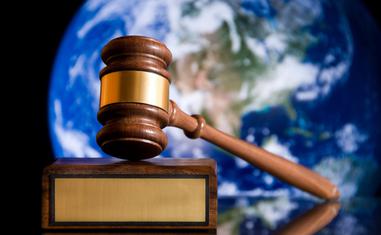The views expressed in our content reflect individual perspectives and do not represent the authoritative views of the Baha'i Faith.
According to the Baha’i writings, universal peace cannot be achieved until a strong and functioning Supreme Tribunal is established. Abdu’l-Baha, the son and successor of Baha’u’llah, wrote:
So long as [religious, racial, national and political] prejudices survive, there will be continuous and fearsome wars. To remedy this condition there must be universal peace. To bring this about, a Supreme Tribunal must be established, representative of all governments and peoples; questions both national and international must be referred thereto, and all must carry out the decrees of this Tribunal. Should any government or people disobey, let the whole world arise against that government or people.
RELATED: Blueprint for a World Federation: An Effective World Court
Those are the words of a captive who wrongfully spent 56 years in prison for his religious beliefs; words which resonate as much today as they did when written. Abdu’l-Baha wrote and spoke extensively about the importance of a supreme tribunal long before one formally existed. In a speech he gave in Montreal in 1912, he said:
The world is in greatest need of international peace. Until it is established, mankind will not attain composure and tranquility. It is necessary that the nations and governments organize an international tribunal to which all their disputes and differences shall be referred. The decision of that tribunal shall be final. Individual controversy will be adjudged by a local tribunal. International questions will come before the universal tribunal, and so the cause of warfare will be taken away.
Abdu’l-Baha clearly foresaw the future authority such an international court could potentially possess. He furnished a roadmap for the formation and function of this new court over 100 years ago, stating in a letter to the International Hague Tribunal, a forerunner of today’s global system of governance, that:
… national assemblies of each country and nation … should elect two or three persons who are the choicest men of that nation, and are well informed concerning international laws and the relations between governments …
The international tribunal’s representation, Abdu’l-Baha suggested, would be proportionate to each nation’s population and confirmed by both its parliament and president. More notably, he stated in the same Hague Tablets that:
… when the Supreme Tribunal gives a ruling on any international question, either unanimously or by majority rule, there will no longer be any pretext for the plaintiff or ground of objection for the defendant.
What if a nation disregarded the final verdict of this world court? Abdu’l-Baha laid out the consequence of non-compliance:
In case any of the governments or nations, in the execution of the irrefutable decision of the Supreme Tribunal, be negligent or dilatory, the rest of the nations will rise up against it, because all the governments and nations of the world are the supporters of this Supreme Tribunal.
Abdu’l-Baha explained that this mandate to “rise up” against recalcitrant nations did not necessarily mean the use of military force. Instead, he said, the world has become so inter-connected and interdependent that economic embargoes could exert the necessary persuasive elements:
… all the members of the human family, whether peoples or governments, cities or villages, have become increasingly interdependent. For none is self-sufficiency any longer possible, inasmuch as political ties unite all peoples and nations, and the bonds of trade and industry, of agriculture and education, are being strengthened every day. Hence the unity of all mankind can in this day be achieved.
Today, the Baha’i International Community (“BIC”), a non-governmental global organization that has established consultative status with several United Nations’ bodies, continues to carry out his vision towards a strengthened world court. In its statements, the BIC has said:
The World Court should act as an umbrella for existing and new thematic courts that arbitrate and adjudicate international cases within specific thematic domains.
In the interests of Justice, which is the only principle upon which the edifice of durable peace can be raised, it is proposed that the International Court of Justice be given compulsory jurisdiction in all legal disputes between states …
RELATED: We Must Face the Risks to the World’s Future – Now
One international court currently exists – the International Court of Justice — but only 66 nations currently recognize and accept its global jurisdiction. Civil society and international order cannot be built on anything less than the foundation of a respected judiciary. It is a well-established notion, as this statement from the BIC points out, that “… in any system of governance, a strong judicial function is necessary to moderate the powers of the other branches and to enunciate, promulgate, protect and deliver justice.”
How can humanity survive without justice? How will humankind mature if we do not observe the compulsory jurisdiction of a World Court? As the BIC has noted, this type of drive towards justice “has been among the fundamental forces in history and without doubt no lasting world civilization can be founded unless it is firmly grounded in the principle of justice.”
Domestic justice is no longer sufficient. The community of nations recognized that fact years ago after two massively destructive world wars, and has attempted to stop such carnage by establishing global institutions that can moderate and control unbridled national sovereignty. International justice is necessary for our interdependent world, and is the only hope for a peaceful and sustainable community of nations. As the Baha’i teachings and the BIC have repeatedly pointed out, only the collective notion of international justice can “translate the dawning consciousness of humanity’s oneness into a collective will through which the necessary structures of global community life can be confidently erected.”
We must all toil to make this Supreme Tribunal a reality.
—-
This article is excerpted from Moving Towards a Supreme Tribunal: America’s 21st Century Obligation to Foster Peace by Armin J Jezari
You May Also Like
Comments

















While our actions can bring about a spirit in the world that could allow for, this, I believe it would be in the purview of the Universal House of Justice to make this decisions when it feels the time is right.
One of the Guardian's first thoughts was to establish the Universal House of Justice, but looking at the state of administrative maturity in the worldwide community of Baha'is at that time, he decided the time was not yet right for that to happen. I think it is too ...soon to establish a World Court with the evidence of the UN as one indication.